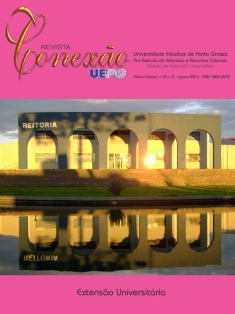DEPRESSÃO PÓS-PARTO BASEADA NA ESCALA DE EDIMBURGO - DOI: 10.5212/Rev.Conexao.v.12.i2.0008
DOI :
https://doi.org/10.5212/Rev.Conexao.v.12.i2.0008Mots-clés :
Enfermagem, Depressão Pós-Parto, Saúde MentalRésumé
A Depressão Pós-Parto é um transtorno psíquico moderado a severo, tendo início na segunda ou terceira semana do puerpério. Desta forma, objetivou-se conhecer os fatores que predispõem o surgimento da Depressão Pós-Parto em puérperas atendidas pelo projeto Consulta de Enfermagem, a partir da Escala de Edimburgo. Trata-se de pesquisa quantitativa, descritiva, oriunda de ação extensionista, Projeto Consulta de Enfermagem no Pré-Natal e Pós-Parto, com coleta oriunda de questionário estruturado e Escala de Edimburgo. Aspectos éticos respeitados, 466/2012. Este estudo resultou numa prevalência de 7,8% mulheres predispostas a desenvolverem a depressão pós-parto e mostrou os principais fatores de risco: baixa escolaridade, baixa renda familiar e estado civil de solteira/divorciada. O estudo sugere a importância do conhecimento sobre a Depressão Pós-Parto por profissionais de saúde, para que quando se depararem com situações que possam oferecer risco para o surgimento da doença, saibam de imediato como intervir.Téléchargements
Téléchargements
Publié-e
Numéro
Rubrique
Licence
a) Os autores mantêm os direitos autorais e concedem à revista o direito de primeira publicação, com o trabalho simultaneamente licenciado sob a Creative Commons Attribution License que permite o compartilhamento do trabalho com reconhecimento da sua autoria e publicação inicial nesta revista.
b) Ao submeter um artigo à Revista Conexão UEPG e tê-lo aprovado os autores concordam em ceder, sem remuneração, os seguintes direitos à Revista: os direitos de primeira publicação e a permissão para que a Revista redistribua esse artigo e seus metadados aos serviços de indexação e referência que seus editores julguem apropriados.
c) Os leitores são livres para transferir, imprimir e utilizar os artigos publicados na Revista, desde que haja sempre menção explícita ao(s) autor (es) e à Revista Conexão UEPG e que não haja qualquer alteração no trabalho original. Qualquer outro uso dos textos precisa ser aprovado pelo(s) autor (es) e pela Revista.

Este obra está licenciado com uma Licença Creative Commons Atribuição 4.0 Internacional.





